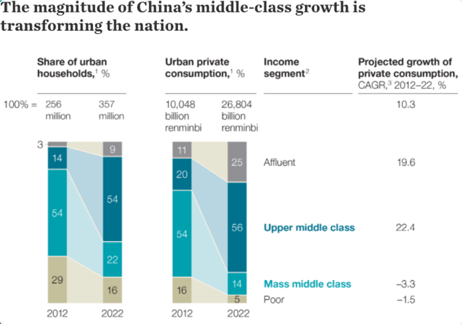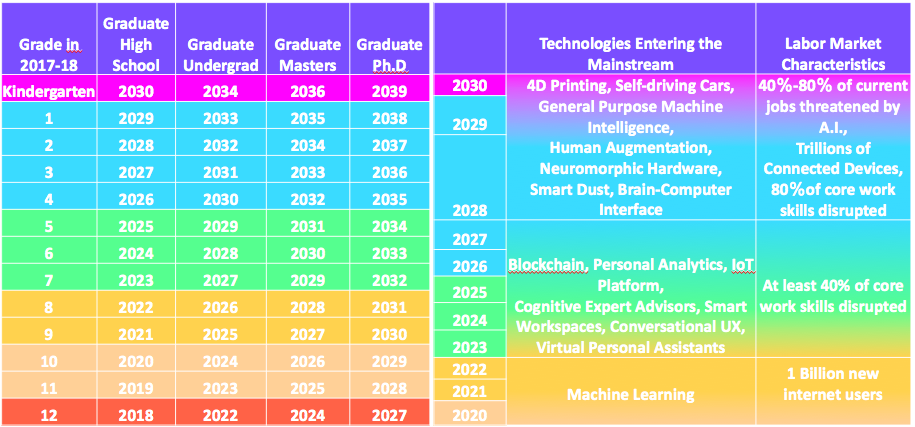The Disruption of our Educational Systems & The Market Bubble in Private K-12

I make some admittedly strong claims here that are based off both my own professional experience as well as market research and years of following industry and tech trends. I welcome responses from both those who wish to set me straight as well as those who wish to wave the same warning flag.
The private K-12 education market here in China is experiencing a bubble. The market projections are rosy with consistent growth to match the rise of the Chinese upper-middle class and there is an obvious race among large educational corporations to fill the market space and establish brand dominance through rapid expansion. Nonetheless, I find myself arguing with increasing urgency that private K-12 education and universities are entering a decade of crisis.
There are three main reasons I am confident a crisis is impending:
- The Return on Investment for the educational dollars spent by parents is poor.
- The system of credentialism upon which the value of university degrees has been based will be increasingly disrupted by a preference for skills verification as a more efficient means of talent assessment in hiring processes.
- Traditional educational systems and institutions are, by their nature, slow to adapt.
Jump to TLDR/Putting the Pieces Together at the end of this article if you just want the core thoughts on this.
The Scene: Millions Spent on the Path to Underemployment

The Price of Private K-12
Over the five years I spent in Shanghai leading development of a private international program for grade 9-10 Chinese students transitioning to international education, our tuition more than doubled. When we began, with no reputation and a muddy market positioning, we were charging 66,000元 per annum. After five years we had quadrupled our student intake and raised our tuition to 138,000元 per annum. It would have been higher had the government not limited our tuition increases but it was still considered inexpensive in the market.
Last month, having dinner with a director of education and a principal, I was told that parents putting their children into private education at the start of high school are counselled to have a minimum of 2,000,000元 set aside for their child's future education. This is not in Shanghai or Beijing, but a third tier city of China. The spending includes not only the tuition for high school classes but also money that needs to be spent on private tutoring and additional classes for tests such as the TOEFL, IELTS or SAT and their undergraduate fees.
Worth the investment?
A small minority of students will come out the other side of K-12 and make their way into elite universities of the world. These students have a much higher chance of benefitting from the network and brand of their university. Most however, will enter mid-range universities with less recognizable brands and far less ability to open doors for their grads. For this majority of students, the job market is already tough. A degree from abroad does not lead to increases in earnings proportional to the increased costs of obtaining one.

This situation is also likely to become much more dramatic over the coming decade. Firstly, we will see a high percentage of core work skills being displaced by advances in A.I., and, secondly, we will see a dramatic increase in the world’s internet population as literally billions of people in emerging markets join the online world. Just as the opportunity for manufacturing to move to lower cost centers of the world created downward pressure on manufacturing wages in developed nations, ultimately making much of the manufacturing in developed nations too cost-inefficient to sustain, the combined influence of both A.I. and billions of new netizens will exert a dramatic downward pressure on the value of much of the world’s knowledge work. No doubt, new opportunities and new jobs will also be generated but it seems unlikely that most students are being prepared for these or that they will be able to re-skill quickly enough to transition.
For the families pouring millions of RMB into their children’s education, I expect it will be a stark realization that their children will not receive the desired benefit of a stable and prosperous future. They will realize that their child’s education was an investment that will not pay off, or an insurance policy that will not pay out.
The Disruption of Credentialism: New Efficiencies in Talent Matching
Credentialism is the system by which we depend upon degrees, certificates, diplomas etc. as a means of verifying a person’s qualities. This system has been resilient because it has provided efficiency for companies and other institutions that target certain skills, knowledge or class for their recruitment. The resiliency of credentialism is what makes holding a university degree advantageous, but credentialism is in the process of being largely overturned by systems of actual skills and knowledge verification. Skills verification processes and talent-matching processes, independent of credentials will prove themselves to be far more efficient and effective for organizations recruiting talent.
Initially, skills verification processes are most easily applied to technical industries where hard skills can be verified though requiring applicants to demonstrate their capacities through assigned tasks. As capacity for verification of a more diverse range of applicant characteristics expands, we will see a broader erosion in the value of credentials. There are likely to be industry/role-specific thresholds of good-enough performance in candidate verification that will make credentialism a clearly less efficient method of candidate selection/elimination.

Death by Organisational Design: Lumbering Educational Dinosaurs vs. Limber New Models
Even if educational boards, directors and administrators recognize the inadequacies of current models, I have little faith that they will be able to adapt with sufficient speed to stay relevant. The reason for this is simple: the organizational structure and design of schools is typically bureaucratic, political and focused on maintenance of standards that match requirements of other bureaucratic and political bodies. Schools struggle and strive to improve internal processes in order to have their teachers and students match the requirements of governing bodies that provide authorizations and certificates. They are trusted to the extent that they are capable of surpassing those external requirements and their bureaucratic processes are designed to satisfy those goals. They are not adapted to do something radically different and are certainly not adapted to change rapidly. The greater the distance between an organizations current resources, culture and practices and the needed resources, culture and practices for where they want to go, the longer it will take to make the transition. Based upon my experiences, most educational institutions will take a long time to transition.

As traditional models of education falter, we will continue to see a rise in alternative models of education that are driven by demands of the market and are much more nimble. A key factor among these will be the offering of improved online education models, the profitability of which will be based upon addressing the needs of the long tail rather than just the affluent minority.
TLDR / Putting the Pieces Together
These changes arising together will put traditional education into crisis:
- the dropping value of credentials (degrees, diplomas, certificates etc.) in the labor market as a result of more efficient methods of skills and knowledge verification as well as more efficient talent matching tech
- the rise in alternative methods of highly individualised and high quality education delivered at low cost online for the masses
- a dramatic increase in the world’s online population and their entry into the global labor market for knowledge work
- the rise of A.I. disrupting core labor market skills, especially knowledge worker skills
- the distance between the current resources, cultures and practices of traditional educational institutions and where they need to be in order to survive these changes is too large
Ultimately, the market will realise that the institutions they have trusted are no longer delivering the benefits they care most about. The bubble will pop for the traditional models and advantage will shift to new models that are more limber and adaptive.
We're in for a wild and bumpy ride.
![]()
Hi. I am a volunteer bot for @resteembot that upvoted you.
Your post was chosen at random, as part of the advertisment campaign for @resteembot.
@resteembot is meant to help minnows get noticed by re-steeming their posts
To use the bot, one must follow it for at least 3 hours, and then make a transaction where the memo is the url of the post.
If you want to learn more - read the introduction post of @resteembot.
If you want help spread the word - read the advertisment program post.
Steem ON!